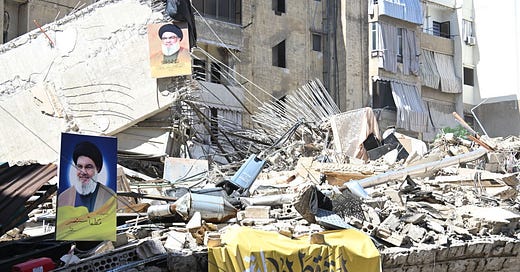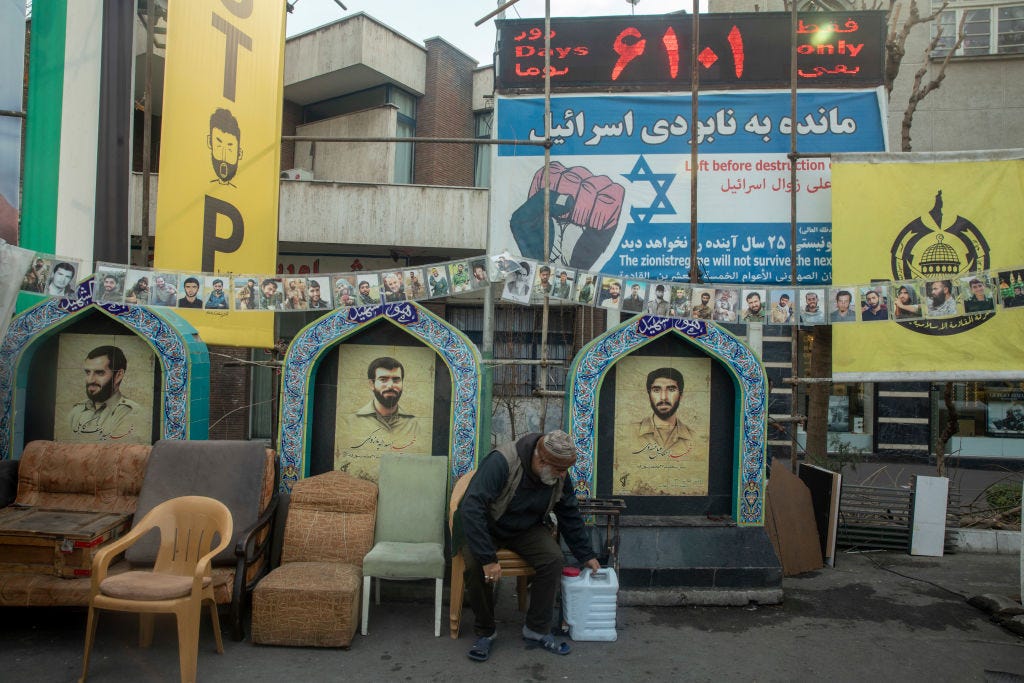
The Free Press

In Palestine Square, in the center of Tehran, Iran, stands a clock tower that doesn’t tell regular time. Rather, it tracks forward to the year 2040, by which Iran’s Supreme Leader, Ayatollah Ali Khamenei, has proclaimed the state of Israel will be destroyed. Today, it reads: 5,567 days.
“God willing, there will be no such thing as a Zionist regime in 25 years,” Khamenei told his followers almost a decade ago. “Until then, struggling, heroic, and jihadi morale will leave no moment of serenity for Zionists.” Banners and billboards celebrating the doomsday countdown have proliferated across Iran, and even into neighboring Iraq.
Many Western analysts dismiss Khamenei’s threat as bluster. But Prime Minister Benjamin Netanyahu and his war cabinet are taking the Supreme Leader at his word as they plan Israel’s response to Iran’s unprecedented ballistic missile attack on the Jewish state this week.
Netanyahu is now weighing directly striking Iranian nuclear, military, and energy installations to deter Iran—and derail Khamenei’s countdown clock. Current and former Israeli officials told The Free Press that the prime minister sees the next four months—when the U.S. is helmed by a diminished president and consumed by an election and political transition—as a singular window for Israel to pursue its military aims without Washington’s constraints. (The White House has sought to hold the Israeli military back repeatedly in the past year, most notably, according to a recent report in the Financial Times, by blocking a 2023 strike on the leader of the Lebanese militia, Hezbollah, in the first days of Israel’s war in the Gaza Strip. And on Wednesday, President Joe Biden said he wouldn’t support an Israeli attack on Iranian nuclear facilities.)
The Israel Defense Forces have made significant gains in their campaign against Tehran by crippling Hamas, Iran’s proxy in Gaza, and, over the past weeks, taking out the leadership of Hezbollah. What began as pager explosions in the hands of Hezbollah militants last month, and then airstrikes against the militia’s positions in Lebanon, has turned into an IDF ground operation into the country’s south in recent days.
But Israeli officials insist that crippling Iran’s proxies is insufficient. Ultimately, what the Jewish state’s security requires is eliminating the possibility of Iran gaining nuclear weapons.
Tehran possesses dozens of nuclear facilities, some secret and in deep and fortified underground bunkers, which Israel’s air force is probably unable to destroy on its own. It needs American support—something that’s unclear if even a future Trump administration would provide, given how destabilizing a war would be for the region and the global economy.
Consider Fordow, a uranium enrichment site that sits 260 feet under a mountain in a fortified bunker near the holy city of Qom. Israel has some deep-penetration munitions, such as the GBU-28, which could do some damage to the facility. But without the assistance of the U.S. military and, in particular, the sharing of its most powerful bunker-busting bomb, the Massive Ordnance Penetrator, Israel is unlikely to completely destroy Fordow, said outside analysts. This could allow Tehran to move ahead with the production of a weapon even after an Israeli attack. And this is to say nothing of potentially using dozens of other clandestine sites to advance its aims.
“Israel has formidable military capabilities, but Fordow represents a difficult penetration challenge even for the U.S.,” said Mark Dubowitz, CEO of the Foundation for Defense of Democracies, who has discussed military planning with Israeli leadership in recent months. But he added that the IDF may still have more “surprises.”
Israeli and outside nuclear experts believe Iran is just days away from having enough enriched uranium to build a single atomic bomb, if Khamenei makes the political decision to purify it further into weapons-grade material, and weeks away from having many more. Israeli officials worry that Tehran could use Washington’s political distractions to make a dash towards a bomb—which would drastically shift the power balance in the Middle East.
The pressure on Netanyahu to strike Iran, both from his political allies in Israel and rivals, is intensifying. “Let’s take the opportunity, and [hit] Iran—to take out some very important targets,” retired general Yaakov Amidror, the prime minister’s former national security adviser, told a small gathering of Middle East experts shortly after the Iranian attack this Tuesday. “Target—in two, three areas—and to show the Iranians, unlike you, you lose 180 missiles. We lose much less. But we are more accurate, and we know what to do, how to do it. . . And we can penetrate your system.”
Former prime minister Naftali Bennett demanded on Wednesday that Netanyahu destroy Iran’s nuclear program. “Sometimes, history knocks on your door and you’ve got to seize the moment,” he wrote on X. “If we don’t do it now, I don’t see it ever happening.”
With Hezbollah in disarray, Israel has an opportunity to strike Iran directly in a way it hasn’t in decades, said the current and former Israeli officials. But the question of what sites to attack, and when, is the primary issue Netanyahu and his war cabinet are grappling with right now.
Hitting Iran’s missile batteries and development facilities, as a form of direct retaliation, are high on the list, officials said, as are compounds of the Islamic Revolutionary Guard Corps, or IRGC, given the organization’s lead role in building the Axis of Resistance and serving as Khamenei’s praetorian guard. IRGC commanders in recent days threatened to strike Israeli oil facilities and other critical infrastructure in response to an Israeli strike.
Israel’s primary target is likely to be Iran’s vast and disparate nuclear infrastructure that includes uranium mines near the Strait of Hormuz and a heavy-water reactor in the northwest, according to current and former Israeli officials. A Mossad operation in 2018 exfiltrated from a Tehran warehouse a half-ton of Iranian government documents and hard drives that told the story of Iran’s secret atomic weapons work, which included dozens of undeclared nuclear sites in addition to the ones operated overtly. These could be targeted in an Israeli strike, said former Israeli officials, as well as the nuclear fuel-production facilities in the cities of Natanz and Isfahan, as well as Fordow.
As the Israel-Iran conflict escalates, Netanyahu’s government is also exploring nonmilitary means to destabilize the Iranian regime and support Khamenei’s opponents, according to people briefed on the emerging programs. Bennett’s administration developed a strategy toward Tehran while in office, called the Octopus Doctrine, which aimed to more directly challenge the regime internally through covert strikes on nuclear, military, economic, and leadership targets, as well as political and information operations. They styled it on U.S. actions during the Cold War when Washington backed dissident political groups, trade unions, and religious bodies to challenge the Soviet Union’s global influence.
One example of this approach, a person briefed on an operation told The Free Press, occurred two years ago when women-led protesters shook the streets of Iran following the death of a 22-year-old Kurdish woman, named Mahsa Amini. Amini had been arrested for inappropriately wearing her Islamic headscarf, or hijab, and died three days later in police custody. Her family said she’d been beaten to death, but Iranian authorities released documents claiming she expired due to organ failure related to an underlying illness.
In response, Israeli hackers from the IDF’s elite cyber command, Unit 8200, targeted the Iranian government’s medical and police records to try and prove Amini’s true cause of death. The documents were seen as providing ballast to the protest movement—known as Woman, Life, Freedom—which has been among the most widespread and enduring in the Islamic Republic’s history. The 8200 hackers succeeded in obtaining some documents and disseminating them publicly, one person briefed on the operation told me.
Last week, Netanyahu released a video message directly addressed to the Iranian people, saying it was time for them to rise up against the regime. “With every passing moment, the regime is bringing you, the noble Persian people, closer to the abyss,” he said. “The vast majority of Iranians know their regime doesn’t care a whit about them.”
Jay Solomon is an investigative reporter for The Free Press and author of The Iran Wars. He most recently worked at Semafor, where he was global security editor; before that, he was chief foreign affairs correspondent for The Wall Street Journal. Follow him on X at @fpjaysolomon and read his piece, “How Close Is Iran to the Bomb?”
To support more of our work, become a Free Press subscriber today:














Thanks to Iran recently blanketing Israel with missiles, Israel is very much justified in retaliating now. That is to say that Israel cannot be blamed for "starting it". As Naftali Bennett suggests, now is the time to attack anything nuclear in Iran -- anything possible -- there will not be another chance.
Some in our government are calling for a "proportional response" to the 180 missiles launched by Iran against Israel last week. OK, let's go with that. There are approximately 9 million jews and 90 million Iranians. So a proportional response for a 10x population should be a 10x missile launch of 1,800 missiles. How's that for "proportional"? (I am a Christian whose blood boils for what has been done by Iran and its vassals.) The 7th century mindset of the Iranian regime must be destroyed!